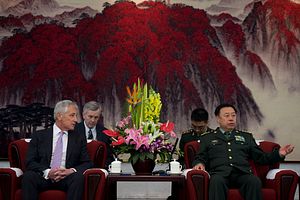During his recent visit to Beijing, U.S. Defense Secretary Chuck Hagel received some harsh criticism from his Chinese military counterpart General Fan Changlong.
Before arriving in Beijing, Hagel had stated: “You cannot go around the world and redefine boundaries and violate territorial integrity and sovereignty of nations by force, coercion and intimidation whether it’s in small islands in the Pacific or large nations in Europe.” While meeting with Hagel in China, Fan responded by telling the U.S. Secretary, “The Chinese people, including myself, are dissatisfied with such remarks.”
Two interesting questions arise from this unusual exchange of harsh words.
First, what should we make of such unusual exchanges between high-level defense officials from China and the United States? Some believe that Fan’s unusually frank talk might be a good thing, as it can reduce misunderstandings and miscalculations for both sides. As Bonnie Glaser, a senior fellow at the Center for Strategic and International Studies, rightly points out, “pretending that differences between China and the U.S. do not exist is unwise and dangerous.” This is an important point. It should be clear to both China and the U.S. that they have serious differences over many issues and being frank about them is not just cheap talk but a first step toward effective bargaining. Moreover, even if such discussions are cheap talk, they can still have a positive deterrent effect, as some international relations scholars have recently demonstrated.
Another interesting question is: why did General Fan make such frank remarks? There are several possible explanations for General Fan’s remarks, including nationalism, personal leadership and deterrence strategy.
The first theory is a popular explanation that contends that rising nationalism has led to a more confident and assertive Chinese foreign policy in general in recent years. In this scenario, General Fan’s tough talk is just another example of the rising nationalism the world has witnessed from China since 2008, when the global balance of power started to shift toward China’s favor. Strong pressures from Chinese society and elite nationalism together are now driving Chinese foreign policy toward more conflicts with others.
Although this explanation has some merits, it cannot explain China’s overall foreign policy or General Fan’s remarks. That’s because, on the one hand, ordinary citizens in China are not very nationalistic at all. Moreover, nationalism is not rising in China but has rather been very passive. Additionally, Chinese nationalism is inconsistent with China’s cooperative foreign policy in general. This last point is especially important because commentators tend to have a selection bias problem in using nationalism to explain China’s tough talk or coercive policies. In other words, they tend to forget that China has been actually compromising on some issues, even those involving its national interests. Indeed, during Chuck Hagel’s visit to Beijing, the two militaries reached a seven-point consensus, including establishing a mutual notification mechanism for major military activities by both sides. Interestingly, very few Western media outlets have reported this consensus, as most attention was focused on China’s tough talk.
The second explanation for Fan’s remarks has something do with the personalities of China’s top leaders, particularly President Xi Jinping’s style of speech. Many observers have noticed that Xi Jinping, after taking over as China’s top leader, has shown a new style of toughness in Chinese foreign policy by changing China’s decades-long strategy of “tao guang yang hui (keeping a low profile)”. Even before Xi took over in 2012, he was known for his straight talk as he criticized some Westerners pointing their fingers at China. Now, as China’s most powerful leader, Xi’s style may have influenced the PLA and its generals.
It is true that sometimes individual leaders play a crucial role in international politics, but it is unclear whether Xi’s new toughness is a result of his personality or China’s growing relative power. What is more important for us to understand is that Chinese foreign policy is the result of the interaction between China’s domestic environment and its international environment. Individual leaders only facilitate the structural tendencies; rarely can leaders reverse structural forces.
The third explanation views General Fan’s tough talk as a signal to deter the U.S. from interfering in China’s disputes with other Asian countries. Thus, what looks like cheap talk is actually quite strategic in nature. To achieve effective deterrence, a country must show its capabilities and demonstrate resolve simultaneously. China did (or tried to do) precisely these two things during Chuck Hagel’s visit in Beijing by 1) giving him a tour on China’s lone aircraft carrier, the Liaoning; and 2) showing China’s resolve through tough talk. Of course, one can debate whether China was successful in demonstrating either capabilities or resolve. Nevertheless, it should be clear that this was China’s strategy, and it is a rational strategy based on classic theories of deterrence.
I tend to believe the third explanation is the closest to reality. Both China and the U.S. are playing a deterrence game. First Hagel tried to deter China from using force in territorial disputes and then China tried to counter this tactic by showing its growing capabilities and stronger resolve.
One thing is certain: this rational game of deterrence will be repeated again and again in future Sino-U.S. relations. It is therefore important that we recognize it for what it is instead of being misled by other more sensational theories like hyper-nationalism.

































